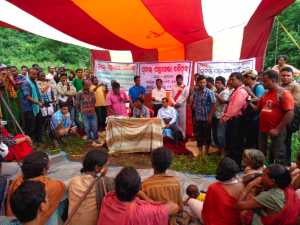
20th August, 2013. Yesterday Jarapa – the last of the twelve villages selected to vote on the proposed Niyamgiri mine – sealed the victory of the mountain and its people over Vedanta, as, like every other village, it unanimously opposed the mine. Niyamgiri has now spoken, and commentators agree that, though the Ministry of Environment and Forests has the final say on the resolution passed by the villages, they would face public outcry if they ignored the clear message of the Dongria.
Thanks to the hard work of activists at, and around, Niyamgiri, the precedent process, enabled by the Supreme Court, has been fully transparent, and the Odisha government’s attempts to use violence and manipulation to influence the verdict, have failed. As a result the world has witnessed the clarity and conviction of Niyamgiri’s people – from Dongria and Kutia Konds, to Dalits, Gaudas and others who live off the bounty of the mountain – who realise that there is no richer life than having self sufficiency, community and freedom. In the palli sabhas Niyamgiri’s tribal people showed their wisdom and knowledge as they articulated their vision of development, and questioned the type of development prescribed for them by the state, which they do not recognise as progress. (More details below). Yesterday they celebrated their great victory with music, drums and dancing.
The Hindu newspaper quotes Lingaraj Azad, leader of Niyamgiri Suraksha Samiti on the final palli sabha vote:
“As all gram sabhas have unanimously rejected mining in the hills despite the sinister design by the Odisha government and ruffians engaged by Vedanta, it is time Vedanta gracefully respected public sentiment and packed off,”
The Ministry of Environment and Forests now have two months to deliver the final verdict on the mine according to the April 18th Supreme Court ruling. After ten years of bribery, corruption, coercion and violence to try to get Niyamgiri’s bauxite, Vedanta has lost a $7 billion investment. This people’s victory should be a lesson to other communities fighting mega-projects who seek short term profit over the longevity of sustainable communities. With strength, solidarity and commitment you can win. As they say in India – “ladhenge jitenge!” – ‘We will fight, we will win!’.
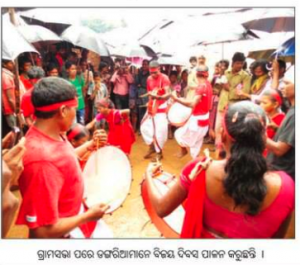
On 19th August in Jarapa village in Rayagada block, 16 out of 26 voters, including 10 women, gathered at the final Palli Sabha on Niyamgiri. Under heavy police presence, and in heavy rain, they repeated the statements given in previous meetings – that they opposed the mine and would not leave the mountain no matter what. The twelve voters said they were ready to face bullets to prevent the digging of their sacred mountain.
When the Palli Sabha was over, Dongria and Kutia Konds from surrounding villages celebrated the victory of their decade old agitation against mining, and the unanimous resolution against the mine of every attending voter in twelve villages in Niyamgiri, by dancing with traditional musical instruments.
Niyamgiri Suraksya Samiti leader and Kutia Kond, Kumuti Majhi, commented:
“The heavy rain is pouring down the mountain and Niyamgiri has chased away Vedanta.”
Sikaka Teladi a Dangoria elderly lady said,
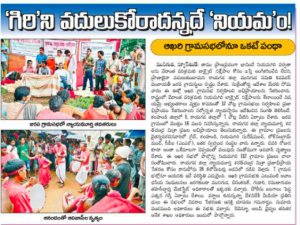 “Niyam Giri is ours; we won’t leave the place at any cost. We don’t know to work as a paid labour. If governments forcefully displace us, where we will go for the work? we won’t like to be a bonded labour of any one, we would prefer to be shot dead but we will not leave our Niyamgiri. Dangor (mountain) is being for Dangoria kondh not for Company. We may die by bullet but we won’t let our Niyam Giri to be mined. ”
“Niyam Giri is ours; we won’t leave the place at any cost. We don’t know to work as a paid labour. If governments forcefully displace us, where we will go for the work? we won’t like to be a bonded labour of any one, we would prefer to be shot dead but we will not leave our Niyamgiri. Dangor (mountain) is being for Dangoria kondh not for Company. We may die by bullet but we won’t let our Niyam Giri to be mined. ”
A week previously, on 13th August, the eleventh palli sabha was held in Khambesi village. Here 37 women and 13 men again voted unanimously against the mine, and rejected the concept of community and individual claims over parts of the village and mountain, claiming the whole of Niyamgiri as their own, and preventing the state government from attempting to compensate them for their losses and allow the mine. Showing their knowledge of the corrupt legal system, and their determination not to be mis-represented one villager said:
“Write what we say and give it to your court. We do not know what you have written. Niyamgiri is our hospital he gives us medicine. We do not have any facility. Now you are coming to see us. Niyamgiri is our God. We wont give it to anyone. Leave us.”
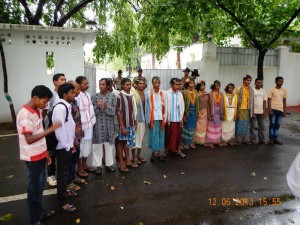
In an interview published by the Economic Times of India on 18th August, tribal leader Lado Sikaka defined the Dongria’s view of ‘development’. At this years AGM in London Vedanta’s chief – Anil Agarwal – waxed lyrical about the need to help the poor tribals with education and health-care. This pro-development argument is the main defense for short term, high private-profit, mega-industrial projects across India, and for many it is very convincing. But Lado challenges the purpose and outcomes of modern education, and, like many who spoke in the palli sabhas, emphasises the importance of his community’s relationship with nature, which teaches them all they need to know, and provides for them. According to the Economic Times:
Lado Sikaka, who is in his 30s, says he has lost respect for the idea of school education in the past decade after he saw how the educated were able to see only the economic potential of the mountain, choosing to overlook that the mountains were also a habitat for several rare species of flora and fauna.
“We are not educated but we have the knowledge needed to live wholesome lives and we are not fools. But if we get educated, we will also become like others and live merely obeying orders and in the process may lose our bond with the land and the mountain.” Sikaka clarifies that he is not against children going to schools.
But there is a precondition. “Only after Vedanta goes back.” That’s ironical because on its website VAL talks about projects for “sustained socio-economic and cultural development of local communities adjoining the plant site” including midday meals for school-going children, establishment of anganwadi centres (preschools) and health camps…The firm focuses on education, health and sanitation programmes…” However, for Vedanta, the ambitious project in Odisha has thrown up one challenge after the other. Recently, Reuters reported that Aviva, one of the largest investors on the London market, criticised Vedanta’s “lack of focus” on social issues and slow progress which it warned was holding back the stock price.
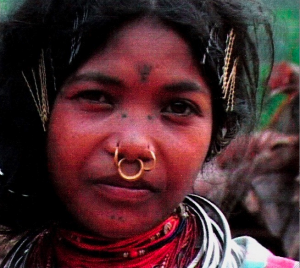 In another article in the Mumbai Mirror, Meenal Baghel recounts her experience of the Lakhpadar palli sabha. Again tribals question the wisdom of a monetary economy and wage labour – touted as positive development. One villager is quoted as saying:
In another article in the Mumbai Mirror, Meenal Baghel recounts her experience of the Lakhpadar palli sabha. Again tribals question the wisdom of a monetary economy and wage labour – touted as positive development. One villager is quoted as saying:
“We’ve heard people in cities are not finding employment. As long as we have this forest, its air and water and fruit, we’ll never go hungry, so why bring change?”
Another points to the unmentioned externalities of industry, which they have seen cause disease and death around the Lanjigarh plant:
“If the machines begin mining they will no doubt also bring dust and water pollution…Who will pay for the ailments arising from those?”
The Dongria are right to question the honesty and motivations of those who promote industrial development on their land. The Mumbai Mirror article cites various occasions on which villagers have been threatened by CRPF and police forces, and even conned away to Puri on a ‘purification’ visit while the perimeter wall of the Lanjigarh refinery was erected.
In 2010, the Ministry for Environment and Forests had rejected the stage II clearance given to Orissa Mining Corporation (OMC) on the ground that mining in Niyamgiri hills violated the provisions of the Forest Rights Act, 2006, the Environment Protection Act and the Forest Conservation Act, but Vedanta and the OMC challenged this decision in the Supreme Court, leading to the precedent April 2013 ruling that gram sabhas should decide, which has not gone in their favour.
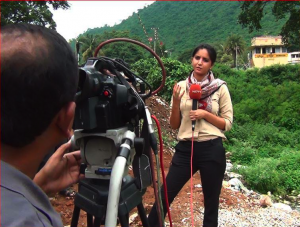
During the long campaign Vedanta and its supporters have tried various ways to discredit the movement – claiming the Dongria were influenced by maoists, or incited by foreign funded NGOs. The latest accusations even suggested that the groups supporting the Dongria were funded by rival mining companies. At the Jarapa palli sabha the NDTV broadcaster was heard desperately trying to find some maoist connection or foreign NGO involvement. NDTV is part funded by Vedanta and has regularly promoted their CSR schemes and industry.
An August 19th article in the Hindu points to the latest attempts at trickery by the Odisha state government, Vedanta’s long-term supporter and crony in crime. The article looks at how the state government has deliberately mis-interpreted the Supreme Court ruling as giving them a final say to decide on the community claims made in the palli sabhas. However, the Environment Ministry has responded clarifying that even if one village claimed that their cultural and religious rights would be affected by the mine the project would have to be rejected. Environment minister Jayanathi Natarajan seems wise to the Odisha government’s tricks, and may have lost her patience with them at long last. She is quoted predicting the next potential manipulative moves of the state, who originally chose just twelve villages out of more than 100 in which to hold palli sabhas, believing they could more easily influence them. She says:
“The State government may seek to turn its own agenda on its head and claim that the small number of villages [which voted] meant that the decision was influenced by ‘vested interests.’ This would then become a battle over perceptions and the State government may take the issue back to court, prolonging the affair further.”
In another article in the Hindustan Times, Lada Sikaka, president of Niyamgiri Surakshya Samiti, urges the state government to test the other villages too so the united voice of Niyamgiri can be truly heard. He said:
“The opinion of the 12 gram sabha is the opinion of all the villages in and around Niyamgiri hills. We demand gram sabha in another 100 villages.”
No doubt Vedanta and the Odisha government have more tricks up their sleeve, but the evidence is now overwhelming that their battle is lost. It is time they gave up and admitted that, for once, Indian democracy has been exercised, and won, from the bottom up.